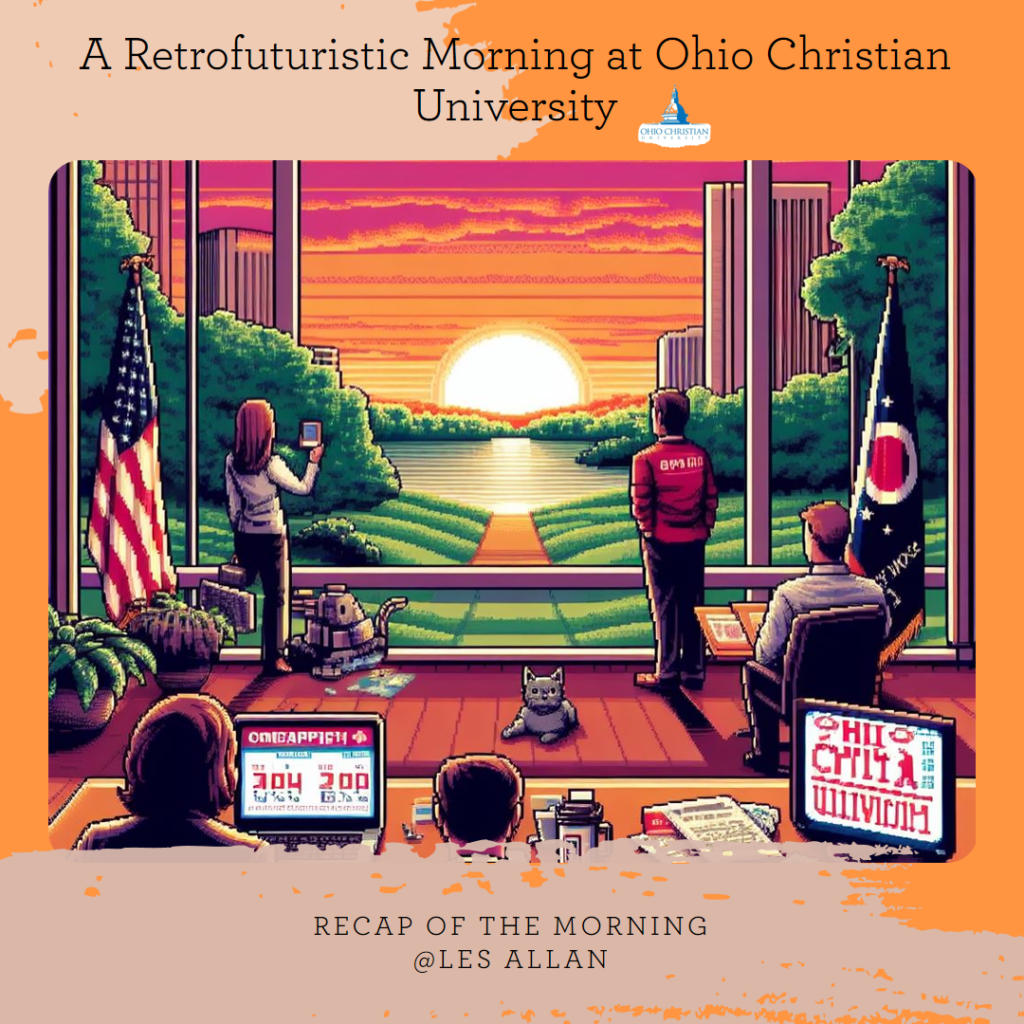
Good Morning and Afternoon:
A Recap of the day so far:
Written to another student at the University – Ohio Christian University
Front Page – Ohio Christian University | Follow Christ, Lead the Way

Thank you for your insightful post on Susanna Annesley-Wesley and her influence on her son, John Wesley. Your exploration of Susanna’s role as a mother and educator and her impact on John’s spiritual and intellectual development is comprehensive and thought-provoking.
I agree with your assessment of Susanna’s commitment to her children’s education and spiritual growth. Her detailed exposition of the Apostles’ Creed and her innovative teaching methods, such as having her older children instruct the younger ones and setting aside time each evening for spiritual discussions, demonstrate her dedication and resourcefulness.
Your point about John Wesley’s exposure to his mother’s independent thinking and strong convictions is fascinating. Susanna’s influence significantly shaped John’s approach to the ministry and his openness that women could contribute to this field.
As you noted, the influence of John’s father, Samuel, also cannot be underestimated. Both parents’ strong spiritual convictions and resoluteness undoubtedly created an environment that fostered serious consideration of moral and spiritual affairs.
Your post provides a compelling look at the Wesley family dynamics and their impact on John Wesley’s life and work. It is a reminder of parents’ profound influence on their children’s development and the paths they choose to follow. Would you be further willing to elaborate on how Susanna’s teaching methods and independent thinking might apply to modern educational practices or parenting? Do you think there are lessons we can learn from her approach that could be beneficial today? Thank you for sharing these valuable insights.
Thank you for your insightful analysis of John Wesley’s upbringing and the significant role his mother, Susanna Wesley, played in shaping his spiritual development. Your detailed account of Susanna’s methodical approach to religious education and its profound influence on John Wesley’s understanding of faith provides a compelling perspective on the origins of Methodism.
I found it particularly interesting how you highlighted the impact of John Wesley’s experiences at Oxford University and his interactions with the Moravian community on his spiritual journey. These experiences, coupled with the foundational teachings of his mother, indeed played a crucial role in shaping Wesley’s concept of Christian perfection, as outlined in his work, “A Plain Account of Christian Perfection” (Wesley, 2017).
Your sources, including the work of Davey & Spurgeon (1970) on Susanna Wesley and Kenneth Collins’ (2000) biography of John Wesley, provide a robust basis for your analysis. As a follow-up, I am curious to know more about the specific teachings or practices of Susanna Wesley that John Wesley incorporated into Methodism. Could you elaborate on this aspect?
The Response to Dr. Gerig:
Greetings Dr. Gerig,
Thank you for your insightful inquiry. Delving into the early life of John Wesley serves as a testament to his perseverance in overcoming significant adversities. From my perspective, if I were to place myself in Wesley’s shoes, I would find the following challenges, particularly daunting:
The loss of nine siblings represents a profound emotional trauma that can significantly impact one’s mental health and overall well-being. The grief and sorrow associated with such a loss can be overwhelming and can also lead to a range of psychological and emotional challenges. Coping with this type of bereavement requires a complex and nuanced approach that takes into account the unique circumstances of each individual. Therefore, healthcare professionals and caregivers should be aware of the different ways in which the loss of siblings can affect individuals and provide tailored support to help them manage their feelings and maintain their mental health.
The issue of Poverty and Debt is an area of concern that presents significant challenges to individuals who have grown up in financially disadvantaged households. The constant anxiety and stress associated with the inability to meet basic needs, coupled with the social stigma and isolation engendered by poverty, can have a profound impact on mental health and overall well-being. The deleterious effects of poverty and debt are particularly pronounced in low-income communities, where access to resources and support systems is often limited. Accordingly, policymakers and stakeholders must prioritize developing and implementing effective policies and interventions to address this critical issue.
Lastly, the topic concerns Wesley’s challenges while attending Charterhouse School in London at a young age while away from home. This situation presents a significant hurdle for a juvenile individual, as it involves a lack of a familiar support system and the necessity to adapt to a new environment. Consequently, it can be difficult for the child (or grown adult) to acclimate to the new school setting and overcome the associated challenges. The challenges they encountered, though daunting, present opportunities for personal growth and character development. John Wesley’s life experiences are a testament to the profound impact they can have on one’s religious views and social approaches, which can ultimately shape society at large. John Wesley faced adversities in his early life, including the loss of siblings, poverty and debt, and the challenges of attending Charterhouse School, which was indeed formidable. However, these experiences also provided him opportunities for personal growth and character development. His life is a potent reminder that adversity can catalyze change, shaping our perspectives and influencing our actions profoundly. It underscores the importance of supporting individuals facing similar challenges and highlights the need for effective policies and interventions to address these issues. Wesley’s story exemplifies human resilience and the power of perseverance. His legacy inspires and guides us to create a more compassionate and inclusive society. Thank you for the opportunity to reflect on such a remarkable life.
Thank you for your insightful reflections on the devotional and its connection to 1 Corinthians 1:1-3, 10-13 (ESV). Your understanding of the Corinthians’ struggles and the sanctifying grace of God is profound. It is inspiring to see how you have related the teachings of Paul and John Wesley to your journey toward spiritual maturity and holiness.
Your openness to acknowledging areas of brokenness and seeking the Holy Spirit’s guidance in your healing process is a testament to your faith and resilience. As you have rightly pointed out, the journey toward our entire sanctification is a transformative pursuit that requires time, patience, and cooperation with God’s sanctifying grace.
I appreciate your candidness in sharing your expectations for Jesus to transform your heart and your commitment to counseling as part of this process. Your journey is a powerful reminder of the transformative potential of God’s sanctifying grace.
Your reflection parallels the devotional and John Wesley’s teaching on entire sanctification. Could you elaborate more on how Wesley’s concept of entire sanctification has influenced your understanding of spiritual growth and transformation? How do you reconcile the concept of entire sanctification with the realities of human imperfection and the ongoing struggle with sin?
Keep up the good work, and stay open to God’s sanctifying grace. Remember, the journey toward spiritual maturity and holiness is continuous, and every step you take brings you closer to becoming the person God intends you to be.
Many Blessings,
Lesallan


